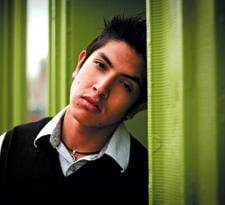“They were bawling their eyes out,” Waawaate Fobister recalls. Fobister had just performed Agokwe, his award-winning play about gay love on the rez, for the first time in front of all his native peers in Kenora, Ontario.
“I had really jock-y guys going, ‘Fuck man, that was a really good play, yo!’”
And the hip-hop guys: “Just saw Agokwe, was blown away, Waawaate did the town, mothafucka,” Fobister reports, perfectly mimicking their vibe and cadence before exploding into relieved laughter at the memory of his peers’ positive reception.
“I was so happy. It was really awesome,” he says, still clearly basking in the afterglow.
“It was scary,” he admits of his decision to take Agokwe to Kenora.
He hasn’t yet performed it in Grassy Narrows, his home reservation about an hour north of Kenora near the northwestern Ontario-Manitoba border. But he doesn’t rule it out.
In Agokwe, Kenora plays host to the tentative, complicated and ill-fated attraction between the tightly wound hockey jock Mike and powwow grass dancer Jake, drawn to each other through their shared passion for the physical grace of movement.
For Fobister, the actual Kenora and the realities of Grassy Narrows are just as complicated and challenging — personally, and as part of its Ojibwa First Nations community.
“It’s pretty conservative; everyone’s kind of small-minded,” he observes. “Native people have been colonized and Christianized; some people go to church, so there’s a lot of homophobia on the reserve,” he quickly summarizes.
“I was bullied my whole life by the boys on my reserve,” Fobister recalls. “I was in the closet, but I’m pretty gay,” he adds with a laugh.
“I got a pretty bad beating when I was 15, 16. I was in the hospital for four days, got all this surgery done to reconstruct my mouth.”
The homophobia didn’t stop until Fobister came out.
“It was almost like, ‘Okay, so he is gay,’ so now they can’t say anything.”
“I came out to my dad first, and once I got his approval, no one else mattered.”
“My dad did take it well,” he says. “If my dad didn’t take it well, then I think I’d be in a totally different place.”
If all goes according to plan, his dad will see Agokwe for the first time when Fobister performs in Ottawa after its Vancouver run at The Cultch this month.
Agokwe, which means two-spirited, blossomed from a QueerCab open-mic rant at Toronto’s Buddies in Bad Times Theatre to a 30-minute solo piece in Buddies’ Young Creators Unit to, ultimately, a full-length one-man show involving six characters Fobister inhabits.
Agokwe opened Buddies’ 2008/2009 season as a world premiere, playing to “standing ovations mostly,” Fobister notes.
When Fobister brings Agokwe to Vancouver, it’ll be only his second time performing it in its entirety.
The piece takes place around a weekend hockey tournament, where all the native communities come together.
“Hockey and powwow are the biggest social events that happen in native communities, so they intertwine,” Fobister explains. “Powwow people will go to hockey tournaments, and there’ll be hockey players who powwow dance or sing, so that’s how the two boys connect.”
Homophobia stymies the love that wants to blossom but can’t.
“Back in the day, they could have,” Fobister asserts through his character Nanabush, the mystical trickster spirit who moderates the action with risqué wit and generous sprinklings of traditional wisdom.
A fixture in Ojibwa storytelling, Nanabush, who can be either a man or woman, testifies to what has been lost to history — what could have been for Mike and Jake — but also what can be reclaimed.
Their salvation is also contained within themselves, Fobister contends.
“I don’t try to blame [the past] — sometimes I do a little bit — but it’s also finding something within oneself.”
Fobister, who identifies as both gay and two-spirited, says being gay doesn’t automatically mean you’re two-spirited as well.
“You’ve got to fulfill these roles and responsibilities to consider yourself two-spirited,” he says.
“My career is as a playwright, theatre creator, actor and storyteller, also dancer and a choreographer,” he says. “In the contemporary time, that’s the role that I have to do, to adapt to how this landscape is now across the country and into the United States.”
“It’s to wake up the spirit of my people, because I think a lot of our spirits have been hurt. Our fire is really dim as a people.”
“There’s some people that have strong spirit, and it’s our job to ignite their fire,” he says. “I believe that. That’s my job as an artist.”
Part of the reason for performing Agokwe, he adds, is to bring back teachable-moment storytelling.
Fobister had such a moment in Moosenee, near James Bay, after a performance of Savage, the work of a fellow artist, which includes an excerpt from Agokwe.
A boy who seemed “a bully type” raised his hand during the Q&A to ask if Fobister was “really gay.”
“I said, ‘Yes, I’m really gay!’
“And he goes, ‘Oh, oh okay… well, okay, well… okay… I’m just gonna sit down then.’”


 Why you can trust Xtra
Why you can trust Xtra


